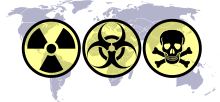
Back سوريا وأسلحة الدمار الشامل Arabic Syyria ja joukkotuhoaseet Finnish Armes de destruction massive en Syrie French תוכנית הגרעין הסורית HE Síria e as armas de destruição em massa Portuguese Оружие массового поражения Сирии Russian Зброя масового ураження Сирії Ukrainian Suriyaning ommaviy qirg'in quroli Uzbek
Syria and weapons of mass destruction deals with the research, manufacture, stockpiling and alleged use by Syria of weapons of mass destruction, which include chemical and nuclear weapons.
On 14 September 2013, the United States and Russia announced an agreement for the elimination of Syria's chemical weapon stockpiles by June 2014.[1] In October 2013, the OPCW-UN Joint Mission destroyed all of Syria's declared chemical weapons manufacturing and mixing equipment.[2] Several months later, Syria disclosed that it maintained a ricin chemical weapons program, which the Syrian government claims has fallen into the hands of Syrian Opposition forces in the east of the country.[3] The following month Syria, further disclosed that it had 4 more previously hidden chemical weapons production sites.[4] The Israeli intelligence community believes the Syrian government retains several tons of chemical weapons.[5]
Syria sought to develop nuclear weapons with help from North Korea, but its plutonium production reactor was destroyed by the Israeli Air Force in 2007 (see Operation Orchard).[6] The Syria file at the International Atomic Energy Agency (IAEA) remains open, amid Syria's failure to respond to the IAEA's questions about the destroyed facility, that the IAEA concluded was "very likely" a nuclear reactor, including the whereabouts of the reactor's nuclear fuel.[7] In January 2015, it was reported that the Syrian government was suspected to be building a nuclear plant in Al-Qusayr, Syria.[8]
- ^ Smith-Spark, Laura; Cohen, Tom (14 September 2013). "U.S., Russia agree to framework on Syria chemical weapons". CNN. Archived from the original on 14 September 2013. Retrieved 14 September 2013.
- ^ Loveday Morris; Michael Birnbaum (31 October 2013). "Syria has destroyed chemical weapons facilities, international inspectors say". The Washington Post. Archived from the original on 31 October 2013. Retrieved 31 October 2013.
- ^ Mike Corder (17 September 2011). "Syria had ricin program: OPCW document". The Daily Star. Associated Press. Archived from the original on 20 September 2014. Retrieved 21 September 2013.
- ^ "Syria declares new chemical weapons facilities". BBC News. 8 August 2014. Archived from the original on 9 October 2014. Retrieved 10 October 2014.
- ^ Harel, Amos. "Israeli intelligence: Syria retains small WMD capacity". Haaretz. Archived from the original on 1 October 2014. Retrieved 1 October 2014.
- ^ "The Silent Strike". The New Yorker. Archived from the original on 18 November 2017. Retrieved 18 November 2017.
- ^ Dahl, Fredrik. "Russia fails to remove Syria nuclear probe from UN atomic watchdog's agenda". Haaretz. Archived from the original on 7 May 2015. Retrieved 19 September 2014.
- ^ Follath, Erich (9 January 2015). "Evidence Points to Syrian Push for Nuclear Weapons". Der Spiegel. Archived from the original on 10 January 2015. Retrieved 10 January 2015.
© MMXXIII Rich X Search. We shall prevail. All rights reserved. Rich X Search
